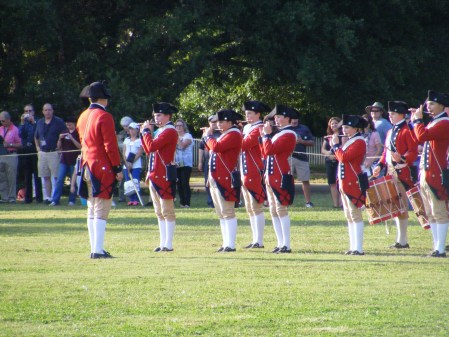L e t ‘ s D I s c u s s
Chapter 1 — Marching Bands
The man with the baton, whose picture I took a few years ago, and I have something in common. He was leading the Williamsburg Drum and Fife Corps, representing the very first U.S. Army marching musical units. They started during the American Revolutionary War. Over time woodwinds and brass were added to become the Army bands like the 30th Army Band that I led as drum major in Munich.

Fife and Drum Corps, WIlliamsburg, VA
It was a very good band. After all, Army bands are made up of professional musicians. The Fort Benning Maneuver Center of Excellence Band is truly impressive right now, not only on parade, but in concert, also. Let me hastily add, the Munich band was quite good not because of me. My MOS was “percussionist.” I was good enough to know that I was outclassed by the rest of the section. However, I think I was quite proficient as a drum major, so I didn’t feel guilty about my musician status. That’s because I had been legendary band director Bob Barr’s first male Jordan Vocational High School Red Jacket Band drum major. He accepted nothing less than a student’s absolutely best effort. And, not only did I lead the band in football game halftime shows, I led it in ROTC Pass in Review parades, so I already knew how to do that. As a side note, when he learned I wanted to be a radio announcer, he introduced me to WDAK’s Ed Snyder, a savvy announcer who had a degree in broadcasting from the University of Alabama. Ed became my mentor and helped me land my first job in broadcasting at WDAK in 1948. Pardon the digression. Back to the subject, marching bands.
Then, there is the college marching band. My experience there is quite limited. In the early 1950s, I was in the Mercer University ROTC band. It was the school’s only band at the time, formed when I was there to play for ROTC parades. I played snare drum in that one. Maybe someone reading this has big time college band experiences to tell us about, bands like Georgia’s, Auburn’s, Alabama’s, Tech’s, etc. I have four great-nephews and one great- niece who played at Georgia, Alabama, and Tennessee. I don’t know if any of them will see this, though.
If I get any comments on this way too long post, I’ll continue the series. The symphony will be Chapter 2.

